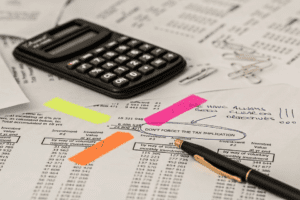Real estate investors often opt for purchasing rental properties to earn profit. These properties ensure stable cash flow while their monetary value increases from appreciation. Moreover, investors also receive tax benefits and deductions when they own real estate.
Though purchasing properties for income is a profitable method, there’s much more to learn and understand before getting yourself into the real estate market. This guide will walk you through the pros and cons and the multiple factors associated with rental property investment.
Understanding Rental Properties
A rental property can either be a commercial or residential property rented to a tenant for a certain period. Though the idea of buying a property to rent out for profit seems tempting, it can have its ups and downs.
For instance, the housing market can fluctuate based on location, supply, demand, and the economy.
Types of Rental Properties
Residential rental properties usually include – quadplexes, triplexes, duplexes, and single-family homes.
Residential rental properties provide greater accessibility for beginners as they’re less expensive. Since you’ll need less money upfront, this means easy financing. Residential rental properties can also be easily managed.

The Income to Expect from a Rental Home
When investing in a residential rental property for income, there’s a lot to think about. To make the most of your investment, you must evaluate the expected income, expenses, returns, rewards, and risks associated with the property.
If you’ve done your research, rental property can be a great source of passive income. But it can cost you a lot more if it’s in the wrong condition.
The first step to buying a rental property is considering whether the property will generate a decent income. You can use the 1% rule to assess if the property has good prospects for generating income. This rule says that the gross monthly income on the property should be at least 1% of the property’s value. This will help you cover the potential rental property expenses sufficiently.
A property that fails to meet the guideline may still allow you to fulfill your financial goals.
Expenses of Owning a Rental Property
The 50% rule is a simple guideline to help you estimate the expenses of a rental property. Under the rule, assume that your overhead costs will amount to 50% of the gross annual income on the property.
For instance, a property generating $10,000 each year could incur as much as $5,000 in expenses. For a more accurate expense estimate of owning a rental property, you can categorize property expenses into operating expenses and capital expenditures.
Operating expenditures include property taxes, insurance, routine maintenance, management, and vacancy costs. You will have to endure vacancy costs if the property remains unoccupied for a while.
Capital expenses are large, unpredictable expenses that may include replacing a broken water heater or damaged flooring, roof, or plumbing.
Returns When Buying a Rental Property
Considering your gross income and expenses, you can easily calculate your cash-on-cash return from your rental property. You can subtract the operating expenses from the gross income to determine the annual net operating income.
Then, dividing the net operating income by rental property purchase value will give you the cash-on-cash return. Though there’s no strict rule for a good return, a range of 8%-12% will be reasonable.

Benefits of Owning a Rental Property
With homeownership rates at their lowest levels in 50 years, now’s a good time to invest in a rental property. Statistics demonstrate that the national homeownership rate has reduced by 9% since 2004. Factors such as rising property values explain this major shift away from homeownership.
In addition, younger Americans need the flexibility that renting offers, so they may delay life decisions associated with buying a home. The number of renters in the baby boomer generation has also increased by 4.3 million in the past decade. All these factors add up to the fact that the rental market in the United States is booming and most Americans find renting a more viable option than purchasing.
As renter households are rapidly increasing than owner households, landlords can benefit from the rental market. Considering the investment potential of real estate, you may want to explore its benefits.
-
Source of Passive Income
Among the several benefits of owning a rental property, one of the main attractions is that it can provide a source of passive income. It’s a recurring income that requires little effort to maintain.
It’s an attractive offer for those looking to make extra money or financial security following retirement. Moreover, rental income may be taxed differently than employment income.
Holding an income property for a longer period provides greater potential to pay off bank loans. Maintaining rental income can help you meet this milestone.
The key to success as a rental property investor is being able to assess the value of properties, selecting the right location, evaluating market conditions, and finding great tenants. That’s how you can prepare to reap the benefits of owning a rental property.
Before investing in rental property, you must work out all the cash flows and ensure that being a landlord will be more profitable.
-
Greater Security
Some people may make a temporary move for work while others inherit a family home that they’re unwilling to sell for emotional reasons. There are several other reasons people may have to deal with an empty property. Since a vacant home may lead to maintenance issues and invite squatters, renting out the property is probably best.
It can be difficult to maintain a property if you aren’t living in it, so renting it out will give you peace of mind.

-
Flexibility to Sell
In some cases, one may be prepared to move, but the market conditions aren’t suitable. So instead of selling your property for a loss, rent it out until the market conditions get better. This option will also give you the flexibility to sell once you’re in a stable position to generate profit off your property.
-
Opportunity to Move Back
At times, one might not be able to stay in their current residence because of financial or other reasons. If you need to move temporarily for a job, you’ll have a place to live when you return. However, you must check your local housing and state laws as well as respect the terms of your lease with the current tenants.
-
Appreciation of Property Value
Renting out your property will allow you to hold on to it and benefit from appreciation. This will give you the option to sell when the time is right. Since the amount of appreciation will vary based on the market, do your research on the appreciation potential of different neighborhoods and cities to assess what you should expect.

-
Diversification of Investments
Most Americans have their money already invested in the stock market. Recent studies demonstrate that owning a rental property allows you to expand your portfolio, which can serve as a mode of protection against risk. Moreover, it can help you benefit from favorable market swings.
-
Tax Benefits
The Internal Revenue Service makes it easier for you to deduct various expenses that come with rental property in these categories: ordinary and essential expenses, improvements, and depreciation.
This means that you can deduct your insurance, the interest on your mortgage, maintenance costs, and physical damage on your property. Depreciation may lead to a nominal loss which you can deduct against other income. However, you must understand that depreciation also reduces the cost basis of a property for calculating capital gains when you plan to sell.
Moreover, the 2017 Tax Cuts and Jobs Act provides multiple tax benefits for landlords. For instance, if you own a flow-through entity and operate it as a limited liability company or sole proprietorship, you can deduct 20% of your net rental income. This will work as long as your overall taxable annual income from all sources following deductions is less than $250,000 for single individuals and $500,000 for married couples filing jointly.

-
You’re in Control
Several factors influence the degree of influence you may have over alternative investments. However, being a landlord allows you to oversee cash flow, contracts and deal with other components. This leads to an opportunity to understand your purchase thoroughly.
Cons of Rental Properties
Besides being a solid real estate investment, rental properties also have a few downsides. Not everyone that gets into rental property investing ends up successful. Like any other investment, buying a rental property comes with several risks. As a result, many aspiring real estate investors may wonder whether the rental property is a good investment. Consider the following disadvantages of owning a rental property.
-
High Entry Costs
Rental property investments have high entry costs compared to shared or other assets. To buy a rental property, you often require a down payment of at least 20%, which can be worth thousands of dollars. Entering the property market continues to become more difficult with property prices constantly rising. As a result, aspiring investors find it hard to finance the purchase of a rental property.
-
Risk of Unreliable Tenants
One of the biggest risks of owning rental property is tenant risk. That’s because bad tenants often fail to pay the rent in time or do not pay at all. They might as well cause property damage that may lead to lawsuits. Moreover, the tenant eviction process is also time-consuming and expensive.
Troublesome tenants can adversely affect your cash flow and create emotional stress for the landlord. To get a good tenant that pays the rent on time and takes care of your property, consider conducting an in-depth screening of potential tenants.
-
Challenging Management
Understanding how to manage a rental property effectively requires time. Some of the landlord’s responsibilities include tenant screening, conducting house inspections, regular property maintenance, and finding good tenants.

-
Dealing With Overhead Costs
Dealing with unexpected expenses is another drawback of owning a rental property. This may include significant repairs that must be done without delay to attract potential tenants. Even if your rental home is vacant, you will have to pay for the ongoing costs such as insurance, property taxes, and HOA (homeowner’s association) fees. Furthermore, finding another renter might as well require additional expenses.
These expenses often come as a surprise and can put a strain on your cash flow. As a result, you may have trouble paying for these costs unless you have an emergency fund.

-
Lack of Liquidity
Rental property isn’t a liquid asset, so it can take several weeks or even months to sell your rental home, based on market conditions. Selling the rental property can also be costly because of the underlying repairs or legal fees. If you need cash urgently, you may be forced to sell below market value.

Buying a rental property offers a stable source of passive income, but before making the purchase, you must understand what you’re getting yourself into. Analyzing the income, underlying costs, and return on the property will help you determine its profitability. When assessing the risks and rewards, be sure to consult with a professional who can help you make an informed decision.
Insula Capital Group Can Help
If you need financial assistance when purchasing a rental property, you can find the best experts and private lenders at Insula Capital Group. We’re private lending and real estate investment company in NYC. With years of experience in the industry, our professionals have been providing fast funding and an easy application process for real estate investors. We also deal in hard money loans for real estate investors, fix and flip funding, refinancing loans, private money loans for real estate, and much more. Whether you want to buy a rental property or sell it, get in touch with us today.




